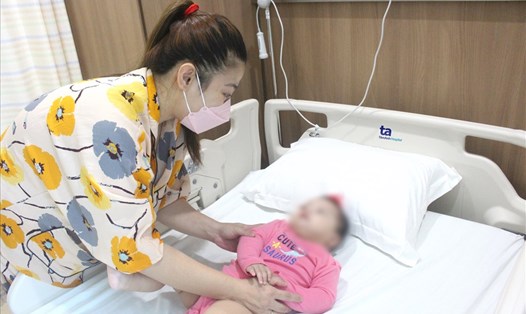Baby Hoang An (child's name has been changed, 4 years old, Tan Phu district, Ho Chi Minh City) during a urinary visit, the baby's mother discovered that her urine was cloudy and blood-colored due to a mixture with urine, so there was no clear distinction between urine and blood.
To reassure, baby Hoang An's mother took him to Tan Phu District Hospital for examination, through urine testing, baby An was diagnosed with a urine infection by the doctor and needed treatment to avoid complications affecting other body functions.
Hoang An was given antibiotics by the doctor, told to drink plenty of water and not to urinate when there were signs of wanting to urinate.
Master, Doctor Ngo Thi Mai Phuong, Department of Pediatrics and Immunization, Ho Chi Minh City University of Medicine and Pharmacy Hospital, said: "Septic hemorrhage in children is not a separate disease but a warning symptom of many serious health problems, this phenomenon occurs when there are red blood cells in urine and can be caused by many different reasons, from urinary tract injury, urinary stones, urinary tract infections, to kidney disease such as acute nephritis or lupus redness of the system".
Blood type is divided into two types: collective blood tieuants - urine that is pink or red to the naked eye, and micro- Sangue - detected only through testing, with difficulty detecting it with the naked eye, parents should take their children to the doctor if they see red urine or when the child has signs of abdominal pain, back pain, urine stings, or has been injured.
According to Dr. Mai Phuong, the level of danger of urine depends on the cause. For example, thrombosis caused by a lower urinary tract infection is usually mild, but if it spreads to the kidneys, it can leave scars, leading to high blood pressure, even chronic kidney failure. In the case of thrombosis due to severe trauma, the risk of severe blood loss and shock is also very worrying.
Treatment will be based on a specific cause. It is possible to simply rest, take antibiotics, or have surgery, use immunosuppressants if related to renal thrombosis.
The doctor also noted about the care regimen: children with stones need to drink enough water, limit calcium; children with urinary tract infections need to change their hygiene habits, not hold urine and hygiene properly.
Parents are advised to closely monitor all unusual changes in their children. Early detection and timely treatment will help children avoid many dangerous complications and recover their health soon.











